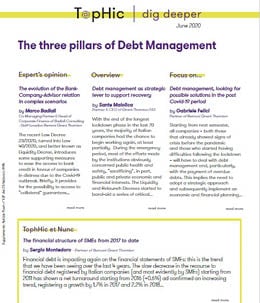-
Transactional advisory services
Find out more about the transactional advisory services of Grant Thornton Financial Advisory Services
-
Valuations
Find out more about the valuations services of Grant Thornton Financial Advisory Services
-
Mergers and acquisitions
Find out more about the merger and acquisition services of Grant Thornton Financial Advisory Services
-
Forensic and investigation services
Find out more about the forensic and investigation services of Grant Thornton Financial Advisory Services
-
Recovery & reorganisation
Find out more about the Recovery & reorganisation services of Grant Thornton Financial Advisory Services
-
Business risk services
Find out more about the business risk services of Grant Thornton Financial Advisory Services
-
Business consulting
Find out more about the business consulting services of Grant Thornton Financial Advisory Services
-
Capital market
Capital market
-
Corporate and business tax
Find out more about our corporate and business tax services.
-
Direct international tax
Find out more about our direct international tax services.
-
Global mobility services
Find out more about our global mobility services.
-
Indirect international tax
Find out more about our indirect international tax services.
-
Transfer pricing
Find out more about our transfer pricing services.
-
Litigation
Our lawyers and accountants can manage all defense measures provided not only by the Italian law, but also by EU regulations and conventions
-
Family business
Find out more about our Family business services.
-
Legal
The client can be assisted in every need and with the same care both on important operations or disputes and on simple matters

-
Back office outsourcing
Find out more about our Back office outsourcing services
-
Business process outsourcing
Find out more about our business process outsourcing services.
-
Compilation of financial statements
Find out more about our compilation of financial statements services.
-
Tax compliance
Find out more about our tax compliance services.
-
Electronic invoicing
Find out more about our electronic invoicing services
-
Electronic storage
Electronic storage is an archiving procedure that guarantees the legal validity of a digitally stored electronic document
-
Revaluation of corporate assets
Find out your civil and fiscal revaluation of tangible, intangible and financial assets
-
Human resources consulting
Find out more about our human resources consulting services.
-
Payroll
Find out more about our payroll services.
-
HR News
HR News the monthly information newsletter by Grant Thornton HR
-
Cybersecurity
GT Digital helps clients structure information security management internal functions, also through partially or totally outsourced functions
-
Agile and Programme Management
GT Digital provides support in the adoption and implementation of different portfolio management
-
Robotic Process Automation
Our “BOT Farm” can rely on digital workers able to help clients in routine activities, allowing employees to deal with more added-value activities
-
Data strategy and management
GT Digital can support clients in seizing the opportunities offered by Big Data, from the definition of strategies to the implementation of systems
-
Enterprise Resource Planning
We support clients in selecting the most appropriate ERP System according to their specific needs, helping them also understand licensing models
-
IT strategy
GT Digital supports clients in making strategic choices, identifying innovation opportunities, comparing themselves with competitors
-
IT service management
We can support with software selection and with the implementation of dedicated tools for the management of ICT processes
-
DORA and NIS 2
The entry into force of the DORA Regulation and NIS2 represents a major step towards the creation of a harmonised regulatory framework
New challenges are approaching for companies and entrepreneurs entering in the so-called phase 2 of the pandemic emergency caused by the Covid-19,
During the most difficult period of the crisis, the private economic interests have been set aside in order to safeguard public health, but with the re-openings of the productive activities, those interests are now resurfacing with a wide range of consequences to face.
Among all, the debt managements plays a crucial role for the stability of companies during the post-Covid-19 scenario.
But, what are the main area of interests and novelties that one have to bear in mind? In the June issue of TopHic our experts analyse under different and interesting views the debt management, underlying tools, opportunities and new characteristics to be aware of.
Overview - Debt management as strategic lever to support recovery
By Sante Maiolica - Partner and CEO of GTFAS
With the end of the longest lockdown phase in the last 70 years, the majority of Italian companies had the chance to begin working again, at least partially. During the emergency period, most of the efforts made by the institutions obviously concerned public health and safety, “sacrificing”, in part, public and private economic and financial interests. The Liquidity and Relaunch Decrees started to band-aid a series of critical […]
Expert's opinion - The evolution of the Bank-Company-Advisor relation
By Marco Badiali - Co-Managing Partner & Head of Corporate Finance of Badiali Consulting - Staff Location Bernoni Grant Thornton.
The recent Law Decree 23/2020, turned into Law 40/2020, and better known as Liquidity Decree, introduces some supporting measures to ease the access to bank credit in favour of companies in distress due to the Covid-19 outbreak. Briefly, it provides for the possibility to access to “collateral” guarantees […]
Focus on - Debt management: possible solutions post Covid-19
By Gabriele Felici - Partner of Bernoni Grant Thornton
Starting from next semester, all companies – both those that already showed signs of crisis before the pandemic and those who started having difficulties following the lockdown – will have to deal with debt management and, particularly, with the payment of overdue debts. This implies the need to adopt a strategic approach and subsequently implement an economic and financial planning […]
TopHic et Nunc - Financial structure of SMEs from 2017
by Sergio Montedoro - Partner of Bernoni Grant Thornton
Financial debt is impacting again on the financial statements of SMEs: this is the trend that we have been seeing over the last 4 years. The slow decrease in the recourse to financial debt registered by Italian companies (and most evidently by SMEs) starting from 2011 has shown a net turnaround starting from 2016 (+0.6%) ad confirmed an increasing trend, registering a growth by 1.7% in 2017 and 2.2% in 2018 […]

